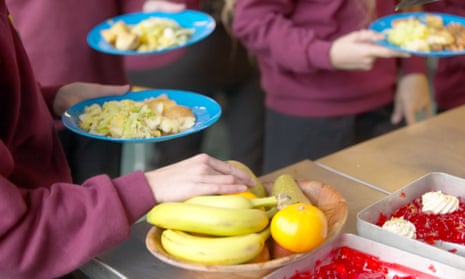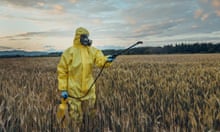The free fruit and vegetables provided by the government to millions of young schoolchildren usually contain the residues of multiple pesticides, according to official tests collated in a new report.
In the last decade, residues of of 123 pesticides were found, while apples and bananas given out recently in schools contained more residues than those sold in supermarkets.
Government experts say “none of the residues are likely to result in any adverse health effects”. But campaigners argue there is great uncertainty about the combined effect of cocktails of pesticides and the increased susceptibility of children.
Pesticide Action Network (PAN), which released its new report as children return to school, said a precautionary approach should be taken and that switching the school scheme to organic produce would cost about 1p per child per day.
Since 2004, the Department of Health (DoH) has sought to promote healthy eating by providing one piece of fruit or vegetable every school day to children aged four to six years in England. The School Fruit and Vegetable Scheme (SFVS) reaches about 2.3 million children in 16,300 schools and costs about £40m a year.
The DoH commissions testing of pesticide residues each term and PAN collated the results from 2005 to 2016. It found that 84% of the 2,238 items tested contained at least one pesticide and 66% contained multiple residues, with as many as 13 different chemicals in extreme cases.
Pesticides need to be toxic to kill the pests that destroy food crops and many of those found as residues are known to be harmful to humans. But their effect on health will depend on the dose to which people are exposed and any cocktail effect, The vast majority of the fruit and vegetables tested in the UK contain residues below the maximum level allowed.
PAN also found that the apples, bananas and raisins provided to schools in 2015 contained significantly more pesticide residues than those in tests of produce sold to the public. The reason for this is not known. However, the most commonly found residue, the fungicide imazalil, is discouraged by the Fairtrade scheme now common in supermarkets, while the SFVS bananas are not Fairtrade. Imazalil can cause developmental problems and may be carcinogenic.
“Our aim is not to alarm parents but they do have a right to know what chemicals are in the food being given to their children,” said Nick Mole at PAN. “While we applaud the DoH’s efforts to get children eating more fruit and vegetables, our research shows that the produce they are being given is generally worse than on the supermarket shelves. Given how little it would cost to switch the scheme to organic, the government shouldn’t be putting our children’s health at risk.”
Valentina Gallo, an epidemiologist at Queen Mary University of London, whose own daughter received fruit and vegetables through the scheme, said: “I think one should be reasonably concerned.”
“The report found a lot of pesticides, though we don’t know the doses,” she said. “It is true the cocktail effect may worsen the effect of pesticides and it is very true that children are much more vulnerable to pesticides. However, there is the balancing effect of eating more fruit and vegetables, because this protects against a lot of diseases.”
“Basically we don’t know enough,” Gallo said. “But there is a gap in research funding because there is a lot of lobbying, with big powers not wanting the research on pesticides to be carried out.”
A D0H spokeswoman said that just because a residue is present, it does not mean that it is harmful to health: “Fruit and vegetables supplied through the SFVS follow the same safety and quality legislation as all other fruit and vegetables in the UK. Maximum residue levels are set significantly below a level that could represent a risk to health, with the most sensitive individuals in the population taken into consideration.”
A spokesman for the Food Standards Agency (FSA) said: “The FSA is confident that pesticide maximum residue levels provide a good level of protection to consumers. On rare occasions when an MRL is exceeded, the FSA will assess if action is necessary to protect consumers.”
The FSA states that fruit and vegetables that have residues below the maximum legal level should not require washing and that in any case some residues are contained within the produce and therefore cannot be rinsed off.
Studying the impact of pesticides on human health is difficult because deliberately exposing people would be unethical. But a study published last week of more than 500,000 births to women living in a farming region of California found that those who were the most exposed to pesticides experienced a 5-9% increase in problems such as premature births and abnormalities.
Another recent study, in Canada, estimated that fruit and vegetable consumption prevented many more cancers than the associated pesticide residues caused, but said cutting pesticide exposure was still desirable.











Comments (…)
Sign in or create your Guardian account to join the discussion